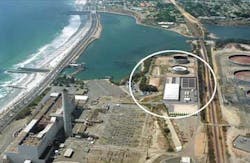It has taken Poseidon Water more than a dozen years to overcome legal and regulatory obstacles, but its $1 billion Carlsbad project is finally in the construction phase. The seawater desalination plant in northern San Diego County will be the biggest facility of its kind in the U.S. and will use energy capture technology that is expected to deliver annual savings of $12 million, Forbes reported.
The energy capture equipment is the product of San Leandro-based Energy Recovery. Its pressure exchangers make it possible to avoid the waste of energy by recovering and re-using it. The Energy Recovery exchangers have a ceramic core that is three times as strong as steel and is bound tightly so that it is difficult for fluid to pass through. This ceramic core is made from a powder and has a baking temperature that the company holds a secret formula for. The core's format is said to be one of the reasons why the equipment is efficient at harvesting energy from the water flow.
According to chief executive Tom Rooney, Energy Recovery expects to provide the Carlsbad plant with 144 pressure exchangers in November or December. The company is hoping that this important project will lead to a boom in the U.S. construction of seawater desalination plants. Energy Recovery already supplies foreign projects with its pressure exchangers and a U.S. flurry of construction activity would be great for the company. Its technology is also attracting the attention of operators in the oil and gas industry, where approval and funding for projects are secured much faster when there is potential for saving energy and money.
Poseidon Resources, the Poseidon Water subsidiary which is building the Carlsbad plant, had to overcome 14 legal challenges related to environmental issues. There were concerns that the facility could have a detrimental effect on the marine wildlife, as well as protracted regulatory scrutiny by local and state agencies. Poseidon finally obtained the necessary permits and funding late in 2012. It expects to finish work and start supplying fresh water in 2016. According to Rooney, the completion of this project will facilitate the approval process for other desalination plants. He said there were currently at least 19 such projects under development in California alone.
RELATED: Researchers develop new desalination method
Seawater desalination has sparked the interest of water agencies for two main reasons: drought and the opportunity to develop and exploit local water sources. Both were the driving force behind the 30 year contract signed last November by the San Diego County Water Authority with Poseidon Resources. The water authority had been keen to find an alternative supply source after a drought early in the 1990s and the threat of reduced supply from its main water provider, the Metropolitan Water District of Southern California. In 1991, the San Diego County Water Authority got 95% of its water from Metropolitan and the plan is to cut the proportion to 30% by the end of this decade.
Bob Yamada, water resources manager at the San Diego County Water Authority, noted that desalination had the benefit of putting local authorities in control. When water is imported, much of the control is relinquished, he said. Depending on demand, the San Diego County Water Authority plans to buy 48,000 to 56,000 acre feet of water annually from the Carlsbad plant.



